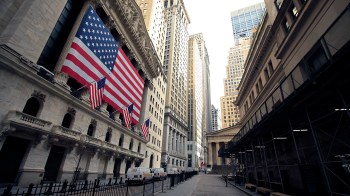Companies opt to spend on acquisitions and mergers
TEXT OF STORY
Kai Ryssdal: It was supposed to be an economic pep talk the president was giving this morning. About how two years ago when Lehman went under, things were bad, but they’re getting better now. He had a little hiccup, though.
President Barack Obama: What we did know was that it took nearly a decade…
Obama taps mic
Obama: How are we doin’ on sound, guys? Is it still going to the press? OK. What we did know was that it was going to take nearly a decade…
With that he was back on track, but the symbolism wasn’t lost at all. Despite the best efforts of the White House and the Fed, the general economic vibe out there is that things could be better.
Over in the other economy, though, the one where companies and corporations live, business is booming. This month alone, the money that’s changed hands in merger and acquisitions has hit almost a quarter trillion dollars. Just today we learned the French drugmaker Sanofi Aventis wants to buy American biotech company Genzyme for almost $20 billion. But if it’s true that the economy could get worse again before it gets better — and just to be clear here, that is still an “if” — but if it’s a possibility, then why are businesses spending all this money?
Here’s our senior business correspondent Bob Moon.
Bob Moon: The reason behind all this corporate dealing is nothing new, really. Many companies were ruthless in cutting costs and hoarding their cash out of fear after the financial collapse. And they’re now sitting on record reserves. By one estimate, the world’s top 1,000 companies are holding around $2 trillion in cash.
The result is something Dean Martin sang about years ago.
Dean Martin singing: Money burns a hole in my pocket…
Hedge-fund manager Steve Gerbel says the boss is feeling pressure.
Steve Gerbel: Investors have for the most part given their CEOs an ultimatum: Either dividend the cash back to me, or go out there and spend and do something creative with it. Don’t just leave it on the balance sheet earning nothing.
Gerbel bets on M&A deals at Chicago Capital Management. He says the weak economy has added to the pressure. It’s tough for companies to grow on their own, so CEOs can either buy new technology to stay a step ahead, or essentially try buying new customers.
Bob Teitelman watches mergers and acquisitions as editor-in-chief at The Deal.
Bob Teitelman: Organic growth is difficult to get, particularly when companies get larger. New product lines need to be developed, and it’s often much easier and cheaper to buy rather than develop it internally.
In a lot of cases, the weak economy has turned vulnerable firms into attractive bargains. And private investment firms are eager to unload companies they’ve had a tough time selling in recent years, so they can return cash to their clients. Teitelman also says pessimism about the recovery is actually spurring a lot of these deals.
Teitelman: There’s an aspect of this of rushing to get out the door before the door shuts. You might as well sell now, before there is a double-dip.
Teitelman says that open question raises another one: Just how long this new wave of deals can last.
I’m Bob Moon for Marketplace.
There’s a lot happening in the world. Through it all, Marketplace is here for you.
You rely on Marketplace to break down the world’s events and tell you how it affects you in a fact-based, approachable way. We rely on your financial support to keep making that possible.
Your donation today powers the independent journalism that you rely on. For just $5/month, you can help sustain Marketplace so we can keep reporting on the things that matter to you.


















